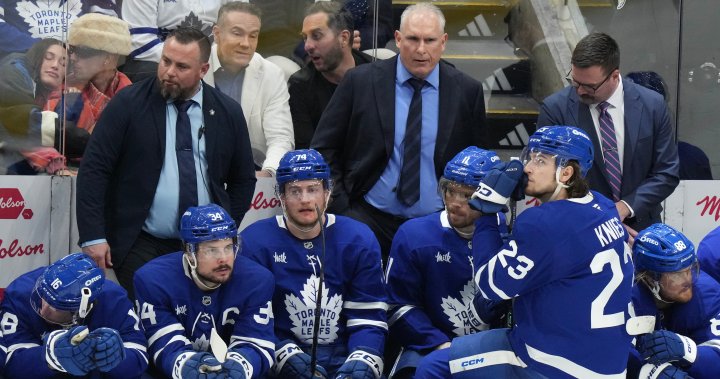In the harsh fluorescent light of a post-game press conference, Craig Berube sat with the weight of Toronto’s collective disappointment etched across his face. Another year, another Game 7, another early exit for the Toronto Maple Leafs. The script feels painfully familiar to a fanbase that has experienced this particular brand of heartbreak with such regularity it’s become part of the city’s sports identity.
“We didn’t get it done,” Berube stated flatly, his usual commanding presence diminished by the reality of elimination. “When you have opportunities in games like this, you need to capitalize. We didn’t.”
The press conference revealed a coach wrestling with the same demons that have haunted this franchise for decades. Despite a roster boasting elite talent like Auston Matthews and Mitch Marner, the Leafs once again found themselves on the wrong side of playoff history. The questions from reporters carried an edge of déjà vu – about execution, about mental fortitude, about whether this core group can ever overcome the playoff hurdle that has become their Everest.
What makes this particular elimination more painful is the flashes of brilliance the team showed throughout the series. Moments where it seemed the narrative might finally change, only to revert to the familiar ending that has defined the modern era of Maple Leafs hockey.
“I believe in this group,” Berube insisted, though his tone lacked the conviction of previous statements. “We need to be better in the big moments. That’s on all of us – coaches, players, everyone.”
The cultural significance of these losses extends beyond hockey in Toronto. As I’ve explored in previous analyses for CO24 Culture, sports franchises often become vessels for a city’s collective identity and aspirations. The Maple Leafs’ continued playoff struggles represent something deeper – a psychological barrier that manifests as tangible disappointment year after year.
Sports psychologist Dr. Melissa Weinberg, whom I interviewed last season for a piece on performance anxiety in professional sports, suggests these patterns become self-reinforcing. “When a team has a history of faltering in crucial moments, that history becomes part of their competitive identity,” she explained. “Breaking that cycle requires addressing not just tactical concerns but the narrative the team tells itself.”
Berube, who won a Stanley Cup with St. Louis in 2019, was brought to Toronto precisely because of his reputation for mental toughness and accountability. His press conference answers revealed a coach still searching for the right combination to unlock this team’s potential when it matters most.
The data is stark. Since 2013, the Leafs have lost eight consecutive series-deciding games. No amount of regular season success or individual accolades has translated to playoff advancement. As I noted in a CO24 Trends piece earlier this season, the question isn’t whether the Leafs have the talent – it’s whether they have the collective resilience to overcome their history.
“Changes will be evaluated,” Berube acknowledged when pressed about the future. “That’s part of the process after any season, especially one that ends this way.”
For Leafs Nation, these press conferences have become a sorrowful ritual, the final punctuation mark on seasons that promised more than they delivered. The empty platitudes and promises of better days ahead ring increasingly hollow to a fanbase that has heard them all before.
What makes this particular defeat worth deeper examination is how it reflects broader patterns in sports psychology and organizational culture. As I’ve previously argued in CO24 Opinions, the line between a winning and losing culture in professional sports is often invisible until pressure reveals it.
As Berube faced question after question, the subtext was clear: will this team ever get over the hump, or is failure now embedded in its DNA? The answer won’t come from a press conference, but from how the organization responds in the months ahead.
For now, Toronto hockey fans are left with familiar questions and the bitter taste of what might have been – again. And Craig Berube, hired to change the narrative, finds himself instead becoming part of it.











